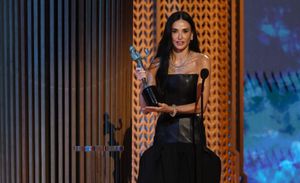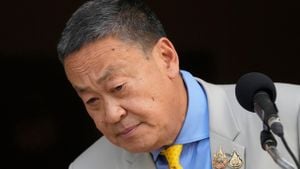The 31st annual Screen Actors Guild (SAG) Awards took center stage on February 23, 2025, at the Shrine Auditorium in Los Angeles, delivering both memorable moments and some technical hiccups. The ceremony, which celebrates outstanding performances in both film and television, featured an array of stars and poignant anecdotes, though some presentations sparked mixed reviews.
Hosted by Kristen Bell, the event aimed to recognize the remarkable contributions artists had made throughout the past year. Despite the glamorous setup, the ceremony opened with noticeable glitches—an unfortunate start for one of the three major televised award broadcasts leading up to the Oscars. Viewers were left feeling slightly frustrated at times as Bel told stories from her career, emphasizing her own moments instead of fully immersing herself in the celebratory atmosphere.
Adding to the tension was Jane Fonda’s acceptance speech for her lifetime achievement award, which became one of the evening’s highlights. The moment quickly turned topsy-turvy as Fonda was interrupted mid-sentence by the announcers urging her to finish. Nevertheless, she pressed on with grace, evoking emotions as she encouraged attendees to acknowledge their current world through the lens of historical prejudice. “This is our documentary moment,” Fonda stated, capturing the urgency of the political climate and proving her continued influence on and off the screen.
While the ceremony faced obstacles, it was powered by significant winners such as Timothée Chalamet and Demi Moore, who each secured awards for their lead performances. Chalamet, embodying future aspirations, claimed his first award of the season and elevated the level of discourse around celebrity stardom. “I aim to be great,” he said, donning his eye-catching leather ensemble, fully aware of the impact he has on audiences. Conversely, Demi Moore reflected on her SAG card’s early days, marking the struggle and perseverance she has experienced through decades.
The honor felt throughout the night is best demonstrated when awardees openly addressed their status of receiving their honors. Kieran Culkin, along with others, noted how unexpectedly heavy the awards felt. This playful jab at the design of the SAG trophies—which left winners setting their awards down for practical reasons—created lighter moments amid the evening's weightier themes.
Despite the organizational challenges, the production values and winners kept fans engaged as some left their seats, pausing to note the body of work included within the evening's timeline. SAG-AFTRA President Fran Drescher emerged on the red carpet dressed to impress, donning her fitted rose-gold suit. Her stylist, Jon Lieckfelt, shared insights on the balance of aspiration and relatability for her look, stating, “We wanted to achieve something relatable, yet aspirational.” Meanwhile, during the event, she reflected on the accomplishments the actors had achieved since the end of the strike, sounding less like the inspirational figure of the past and more as an influencer.
Another standout moment came during the musical segments of the evening, elevulating some of the theatrics for audience members who craved more than mere acceptance speeches. Yet, hosts and musical numbers failed to maintain sustained momentum as they seemed entwined with narratives about hosting performances rather than simply guiding guests through the night. With saxophones wailing and actresses reeling off remarkable talents, the audience’s reactions often felt flat, giving space for moments of awkwardness.
All things considered, the SAG Awards closed with enough surprise moments, leaving the rest of the awards season open-ended. One wonders how these events will shape the future of award shows as they adapt to both artist demands and viewing experiences. While some may tune out, for many, the thrill of envelope openings remains potent enough to overcome the frustrations, hoping for more curated experiences moving forward.



